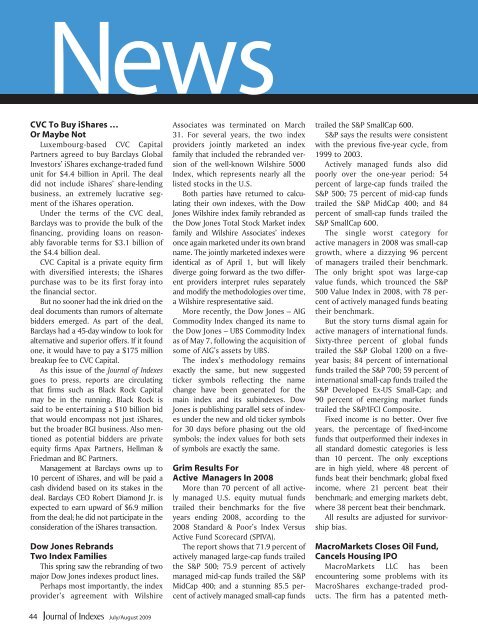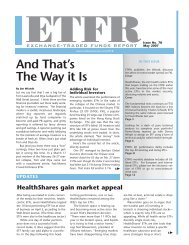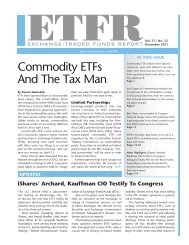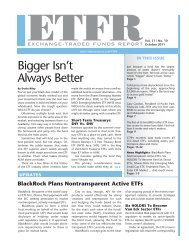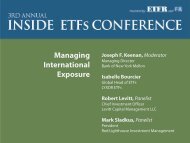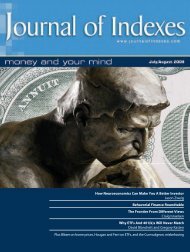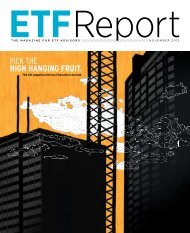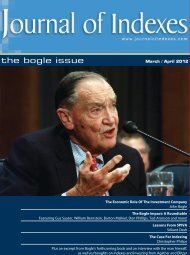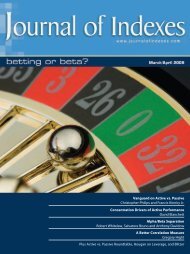How to Kill a Black Swan Remy Briand and David Owyong ...
How to Kill a Black Swan Remy Briand and David Owyong ...
How to Kill a Black Swan Remy Briand and David Owyong ...
Create successful ePaper yourself
Turn your PDF publications into a flip-book with our unique Google optimized e-Paper software.
News<br />
CVC To Buy iShares …<br />
Or Maybe Not<br />
Luxembourg-based CVC Capital<br />
Partners agreed <strong>to</strong> buy Barclays Global<br />
Inves<strong>to</strong>rs’ iShares exchange-traded fund<br />
unit for $4.4 billion in April. The deal<br />
did not include iShares’ share-lending<br />
business, an extremely lucrative segment<br />
of the iShares operation.<br />
Under the terms of the CVC deal,<br />
Barclays was <strong>to</strong> provide the bulk of the<br />
financing, providing loans on reasonably<br />
favorable terms for $3.1 billion of<br />
the $4.4 billion deal.<br />
CVC Capital is a private equity firm<br />
with diversified interests; the iShares<br />
purchase was <strong>to</strong> be its first foray in<strong>to</strong><br />
the financial sec<strong>to</strong>r.<br />
But no sooner had the ink dried on the<br />
deal documents than rumors of alternate<br />
bidders emerged. As part of the deal,<br />
Barclays had a 45-day window <strong>to</strong> look for<br />
alternative <strong>and</strong> superior offers. If it found<br />
one, it would have <strong>to</strong> pay a $175 million<br />
breakup fee <strong>to</strong> CVC Capital.<br />
As this issue of the Journal of Indexes<br />
goes <strong>to</strong> press, reports are circulating<br />
that firms such as <strong>Black</strong> Rock Capital<br />
may be in the running. <strong>Black</strong> Rock is<br />
said <strong>to</strong> be entertaining a $10 billion bid<br />
that would encompass not just iShares,<br />
but the broader BGI business. Also mentioned<br />
as potential bidders are private<br />
equity firms Apax Partners, Hellman &<br />
Friedman <strong>and</strong> BC Partners.<br />
Management at Barclays owns up <strong>to</strong><br />
10 percent of iShares, <strong>and</strong> will be paid a<br />
cash dividend based on its stakes in the<br />
deal. Barclays CEO Robert Diamond Jr. is<br />
expected <strong>to</strong> earn upward of $6.9 million<br />
from the deal; he did not participate in the<br />
consideration of the iShares transaction.<br />
Dow Jones Rebr<strong>and</strong>s<br />
Two Index Families<br />
This spring saw the rebr<strong>and</strong>ing of two<br />
major Dow Jones indexes product lines.<br />
Perhaps most importantly, the index<br />
provider’s agreement with Wilshire<br />
Associates was terminated on March<br />
31. For several years, the two index<br />
providers jointly marketed an index<br />
family that included the rebr<strong>and</strong>ed version<br />
of the well-known Wilshire 5000<br />
Index, which represents nearly all the<br />
listed s<strong>to</strong>cks in the U.S.<br />
Both parties have returned <strong>to</strong> calculating<br />
their own indexes, with the Dow<br />
Jones Wilshire index family rebr<strong>and</strong>ed as<br />
the Dow Jones Total S<strong>to</strong>ck Market index<br />
family <strong>and</strong> Wilshire Associates’ indexes<br />
once again marketed under its own br<strong>and</strong><br />
name. The jointly marketed indexes were<br />
identical as of April 1, but will likely<br />
diverge going forward as the two different<br />
providers interpret rules separately<br />
<strong>and</strong> modify the methodologies over time,<br />
a Wilshire respresentative said.<br />
More recently, the Dow Jones – AIG<br />
Commodity Index changed its name <strong>to</strong><br />
the Dow Jones – UBS Commodity Index<br />
as of May 7, following the acquisition of<br />
some of AIG’s assets by UBS.<br />
The index’s methodology remains<br />
exactly the same, but new suggested<br />
ticker symbols reflecting the name<br />
change have been generated for the<br />
main index <strong>and</strong> its subindexes. Dow<br />
Jones is publishing parallel sets of indexes<br />
under the new <strong>and</strong> old ticker symbols<br />
for 30 days before phasing out the old<br />
symbols; the index values for both sets<br />
of symbols are exactly the same.<br />
Grim Results For<br />
Active Managers In 2008<br />
More than 70 percent of all actively<br />
managed U.S. equity mutual funds<br />
trailed their benchmarks for the five<br />
years ending 2008, according <strong>to</strong> the<br />
2008 St<strong>and</strong>ard & Poor’s Index Versus<br />
Active Fund Scorecard (SPIVA).<br />
The report shows that 71.9 percent of<br />
actively managed large-cap funds trailed<br />
the S&P 500; 75.9 percent of actively<br />
managed mid-cap funds trailed the S&P<br />
MidCap 400; <strong>and</strong> a stunning 85.5 percent<br />
of actively managed small-cap funds<br />
trailed the S&P SmallCap 600.<br />
S&P says the results were consistent<br />
with the previous five-year cycle, from<br />
1999 <strong>to</strong> 2003.<br />
Actively managed funds also did<br />
poorly over the one-year period: 54<br />
percent of large-cap funds trailed the<br />
S&P 500; 75 percent of mid-cap funds<br />
trailed the S&P MidCap 400; <strong>and</strong> 84<br />
percent of small-cap funds trailed the<br />
S&P SmallCap 600.<br />
The single worst category for<br />
active managers in 2008 was small-cap<br />
growth, where a dizzying 96 percent<br />
of managers trailed their benchmark.<br />
The only bright spot was large-cap<br />
value funds, which trounced the S&P<br />
500 Value Index in 2008, with 78 percent<br />
of actively managed funds beating<br />
their benchmark.<br />
But the s<strong>to</strong>ry turns dismal again for<br />
active managers of international funds.<br />
Sixty-three percent of global funds<br />
trailed the S&P Global 1200 on a fiveyear<br />
basis; 84 percent of international<br />
funds trailed the S&P 700; 59 percent of<br />
international small-cap funds trailed the<br />
S&P Developed Ex-US Small-Cap; <strong>and</strong><br />
90 percent of emerging market funds<br />
trailed the S&P/IFCI Composite.<br />
Fixed income is no better. Over five<br />
years, the percentage of fixed-income<br />
funds that outperformed their indexes in<br />
all st<strong>and</strong>ard domestic categories is less<br />
than 10 percent. The only exceptions<br />
are in high yield, where 48 percent of<br />
funds beat their benchmark; global fixed<br />
income, where 21 percent beat their<br />
benchmark; <strong>and</strong> emerging markets debt,<br />
where 38 percent beat their benchmark.<br />
All results are adjusted for survivorship<br />
bias.<br />
MacroMarkets Closes Oil Fund,<br />
Cancels Housing IPO<br />
MacroMarkets LLC has been<br />
encountering some problems with its<br />
MacroShares exchange-traded products.<br />
The firm has a patented meth-<br />
44<br />
July/August 2009


